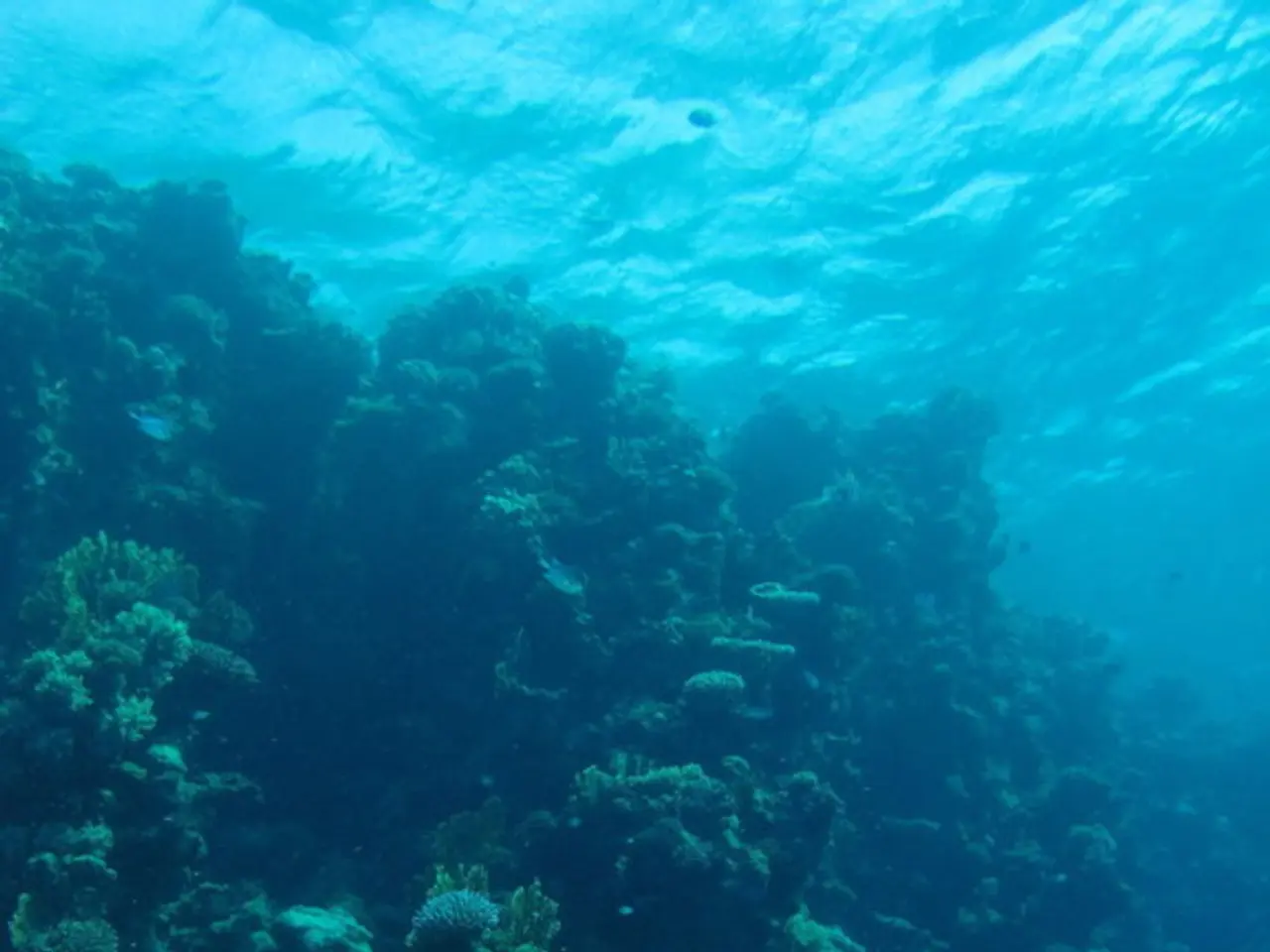Strategies for Celebrating World Ocean Day
The world's oceans, a vital source of life and resources, are facing an unprecedented threat - ocean acidification. Over the past two centuries, the levels of acidity in our oceans have increased by 30-40% due to human-generated CO2 emissions, a trend that is projected to worsen significantly in the coming decades [1][2][4].
This shift in acidity, unseen in tens of millions of years, is causing a rapid and severe drop in ocean pH, directly harming a wide range of marine life. Organisms that build calcium carbonate structures, such as coral reefs and shell-forming organisms, are particularly vulnerable [3][5].
Coral reefs, often referred to as the 'rainforests of the sea', are at risk. Weakened skeletons make them more susceptible to erosion and disease, threatening their survival [3][5]. Shell-forming organisms, including shellfish and some plankton species, have thinner, weaker shells, reducing their resilience and survival [2].
The disruption does not end there. Marine ecosystems face disruption because species that rely on calcium carbonate structures are fundamental to food webs and habitat formation. This acidification also favors some algae that could overgrow reefs and alter community structures [1][3].
The health of our oceans is linked to the overall health of the planet and its ability to maintain a stable climate. The crisis of ocean acidification is a critical threat to biodiversity, fisheries, and global food security due to its broad impact on marine life from microbes up to large fish populations [1].
The good news is, there are actions we can take to help. Using less water can prevent excess runoff from running into the oceans. Using energy sparingly helps conserve energy resources, and reducing emissions slows down global warming, which has a devastating effect on oceans [6].
Choosing non-toxic cleaners and beauty products reduces polluting chemicals in the oceans. Organizing or joining a local beach clean-up is another option for those living near the sea. By 2050, there could be more plastic in the sea than fish if current trends continue, so taking plastic home and recycling it, or putting it in a bin, can make a difference [7].
Education is another key factor. The World Ocean Day website offers ocean-themed resources for kids, including Octonauts themed activities. Watching documentaries like "A Plastic Ocean", "Wonders of the Ocean", and "Ocean with David Attenborough" can also raise awareness about the importance of our oceans and the challenges they face.
Lastly, choosing sustainable tourism options supports companies that care for the environment, especially when the tourism involves the ocean. As we celebrate World Ocean Day globally on June 8th, let's remember the vital role our oceans play in our lives and the urgent need to protect them.
References: [1] NOAA. (2021). Ocean Acidification. Retrieved from https://oceanservice.noaa.gov/facts/acidification.html [2] IPCC. (2019). Global Warming of 1.5°C. Retrieved from https://www.ipcc.ch/sr15/ [3] National Geographic. (2018). How Ocean Acidification Threatens Coral Reefs. Retrieved from https://www.nationalgeographic.com/environment/ocean-conservation/ocean-acidification-coral-reefs/ [4] EPA. (2021). Ocean Acidification. Retrieved from https://www.epa.gov/ocean-acidification [5] Scripps Institution of Oceanography. (2021). Ocean Acidification. Retrieved from https://co2.ucsd.edu/what-is-ocean-acidification/ [6] EPA. (2021). Energy Saving Tips. Retrieved from https://www.epa.gov/energy/energy-saving-tips [7] Plastic Oceans. (2021). Plastic Pollution. Retrieved from https://www.plasticoceans.org/plastic-pollution/
- Kids can learn about the importance of environmental-science, particularly climate-change and its impact on ocean acidification, through Ocean-themed activities on the World Ocean Day website.
- The experiments and investigations in science learning can assist kids in understanding the wonder and fragility of our marine ecosystems, as well as the threat of ocean acidification.
- The disruption caused by ocean acidification extends to education and self-development, as a healthy environment is essential for our overall well-being and future.
- The stress on marine life from ocean acidification, such as the weakening of coral reefs and shell-forming organisms, affects the variety of life on Earth, making active participation in environmental conservation activities vital.
- Through sustainable tourism options that prioritize education and conservation, we can support businesses that respect and protect the environment, especially those focusing on our oceans.
- As our oceans play a key role in maintaining the planet's climate and providing crucial resources, it is essential to act now and take measures like reducing emissions, using less water, and choosing non-toxic products to help mitigate ocean acidification.
- Engaging in activities like beach clean-ups, monitoring plastic use, and recycling can contribute to reducing the threat of plastic pollution in our oceans, supporting the health and sustainability of marine life and ecosystems.




